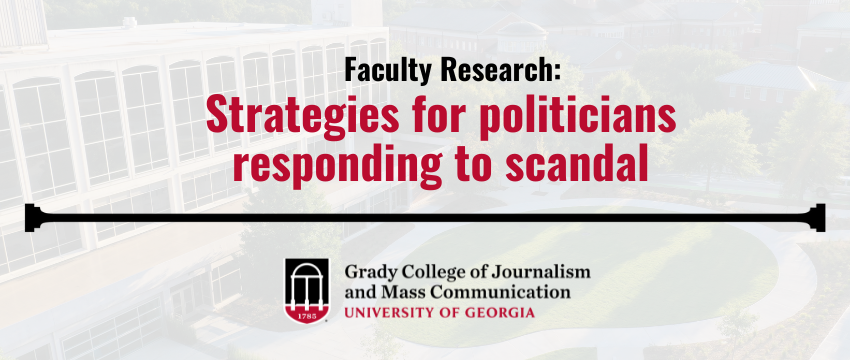Researchers study corrective action for political scandals

Researchers study corrective action for political scandals
When politicians commit a scandal, they try all sorts of different ways to fend it off.
Researchers from Grady College of Journalism and Mass Communication and the School of Communication at The University of Miami tried to crack the code on the most effective crisis communication for a politician who misbehaves.
They conducted experiments testing common political maneuvers including stonewalling, or saying “no comment”; deflecting , or changing the subject; and saying nothing.
“Politicians and their spin doctors probably don’t want to hear this—or maybe they do,” said David Clementson, associate professor in the Department of Advertising and Public Relations at Grady College and lead investigator for the research. “But, the best way to handle a scandal is to apologize and take corrective action after you’ve been caught.”
Researchers also tested strategies that are not as common, but are suggested in theory. They had politicians apologize after the scandal erupted. They tested “stealing thunder,” which is proactively confessing the misdeed before the media or opponents break the scoop. They also tested a combination of stealing thunder and sincerely apologizing—allegedly the gold standard in crisis communication.
Which strategy was the most effective? Simply apologizing.
One study tested right-wing and left-wing partisan scandals in which a politician commits hypocritical corruption. A second study tested whether the results replicate in a sex scandal.
Results showed that an apology was as effective as stealing thunder and as effective as a combination approach, and more effective than all the deceptive ploys.
Apologies are effective because they make voters think the politician is not engaging in a cover-up. The decreased sense of a cover-up enhances trustworthiness in the politician. Then trust in the politician increases voters’ favorable behavior toward the politician. Voters are more interested in voting for a scandalized politician, donating money to the candidate and volunteering for the campaign.
The findings appear in the latest issue of Human Communication Research.
The researchers include Clementson, Grady College Ph.D. student Wenqing Zhao and University of Miami Professor Michael J. Beatty.
Editor: Sarah Freeman, freemans@uga.edu